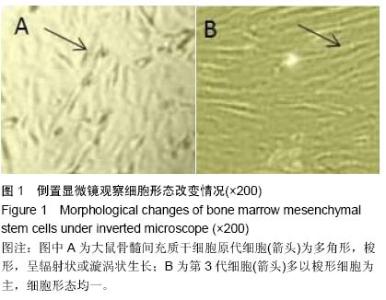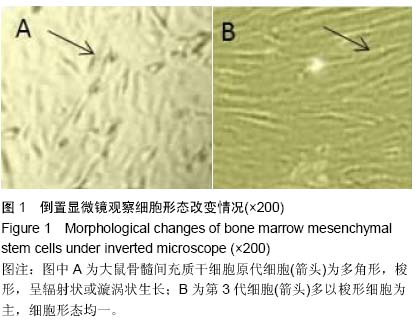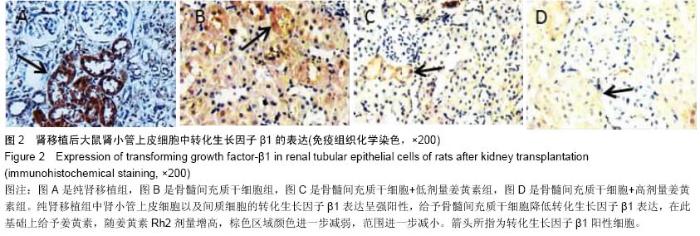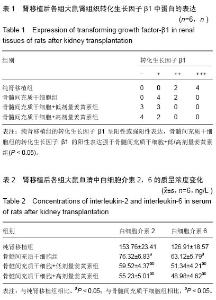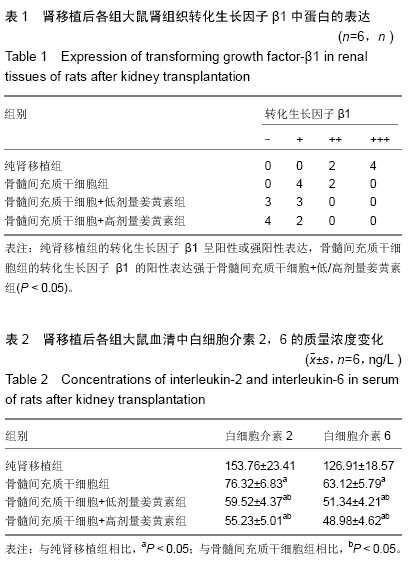| [1] Howard Riehard J, Patton Pamela R, Reed Alan l, et al. The changing causes of graft loss and death after kidney transplantation. Transplantation. 2002;73(12):1923-1928.
[2] 陈选才,李建军,免疫耐受的研究现况及在肾移植中的应用[J].社区医学杂志,2014,12(23):20-23.
[3] 陈正.BM-MSC诱导移植免疫耐受和修复慢性移植肾损伤的初步研究[D].长沙:中南大学,2013.
[4] 余鹏程,供体骨髓间充质干细胞对大鼠肾移植慢性排斥的作用及其免疫调节机制的初步研究[J].广州:南方医科大学,2011.
[5] 王谦,李立,李晓延,等.输注同基因骨髓间充质干细胞联合脾组织抑制诱导肝抑制大鼠的免疫耐受[J].中国组织工程研究与临床康复,2010,14(18):3243-3246.
[6] Zhang W, Qin C, Zhou ZM. Mesenchymal stem cells modulate immune responses combined with cyclosporine in a rat renal transplantation model. Transplant Proc. 2007;39(10): 3404-3408.
[7] Inoue S, Popp FC, Koehl GE, et al. Immunomodulatory effects of mesenchymal stem cells in a rat organ transplant model. Transplantation. 2006;81(11):1589-1595.
[8] Popp FC, Eggenhofer E, Renner P, et al. Mesenchymal stem cells can affect solid organ allograft survival. Transplantation. 2009;87(9S):S57-S62.
[9] 狄建彬,顾振纶,赵笑东,等.姜黄素的抗氧化和抗炎作用研究进展[J].中草药,2010,41(5):附18-附21.
[10] Zhang JH, Wei H, Lin MM, et al. Curcumin protects against ischemic spinal cord injury. The pathway effect. Neural Regen Res. 2013;8(36): 3391-3400.
[11] 罗廷顺,李洪文,刘正文,等.姜黄素的提取分离与药理作用研究进展[J].现代药物与临床,2011,26(2):102-107.
[12] Tang HM, Pan R, Fang WL, et al. Curcumin ameliorates hippocampal neuron damage induced by human immunodeficiency virus-1.Neural Regen Res. 2013;8(15): 1368-1375.
[13] 张妲,金城,骆骄阳,等.姜黄素类化合物体外抗凝血与抗血栓作用研究[J].中草药,2011,42(10):2070-2073.
[14] Yun SS, Kim SP, Kang MY, et al. Inhibitory effect of curcumin on liver injury in a murine model of endotoxemic shock. Biotechnol Lett. 2010;32(2):209-214.
[15] Sompamit K, Kukongviriyapan U, Nakmareong S, et al. Curcumin improves vascular function and alleviates oxidative stress in non-lethal lipopolysaccharide-induced endotoxaemia in mice. Eur J Pharmacol. 2009;616(1-3):192-199.
[16] Roesler R, Brunetto AT, Abujamra AL, et al. Current and emerging molecular targets in glioma. Expert Rev Anticancer Ther. 2010;10(11):1735-1751.
[17] 李偲,朱毅,叶少军,等.大鼠肾移植模型手术改良技巧探讨[J].器官移植,2014,5(3):156-160.
[18] Kim SH, Kim JM, Shin MH, et al. Correlation of epithelial-mesenchymal trasition marker with clinicopathologic parameters in adenocarcinomas and squamous cell carcinoma of the lung. Histol Histopathol. 2012;27(5): 581-591.
[19] Yeo RW, Lai RC, Zhang B, et al. Mesenchymal stem cell: An efficient mass producer of exosomes for drug delivery. Adv Drug Deliv Rev. 2013;65(2):336-341.
[20] 祝旭龙,颜谭,姚维杰,等.大鼠骨髓间充质干细胞的分离与培养方法优化[J].南方医科大学学报,2014,34(11):1621-1626.
[21] Dai LJ, Moniri MR, Zeng ZR, et al. Potential implications of mesenchymal stem cells in cancer therapy. Cancer Lett. 2011;305(1):8-20.
[22] 李晓峰,赵劲民,苏伟,等.大鼠骨髓间充质干细胞的培养与鉴定[J].中国组织工程研究与临床康复,2011,15(10):1721-1725.
[23] Border WA, Noble NA. Transforming growth factor-β in tissue fibrosis. New Engl J Med. 1994;331:1286.
[24] Chen Z, Bouamar R, Van Schaik RH. Genetic polymorphisms in IL-2, IL-10, TGF-β1, and IL-2RB and acute rejection in renal transplant patients. Clin Transplant. 2014;28(6):649- 655.
[25] 王文东,齐若梅.转化生长因子β/Smad3信号通路与动脉粥样硬化[J].中国动脉硬化杂志,2011,(10):875-878.
[26] 刘雪梅,马瑞霞,朱月华,等.肥大细胞、巨噬细胞及转化生长因子在IgA肾病患者肾组织中的浸润及意义[J].中国组织工程研究与临床康复,2007,11(8):1485-1488.
[27] Wang L, Zhang D, Zheng J, et al. Actin cytoskeleton-dependent pathways for ADMA-induced NF-κB activation and TGF-β high expression in human renal glomerular endothelial cells. Acta Biochim Biophys Sin (Shanghai). 2012;44(11):918-923.
[28] 王慧娟.IL-17调节TGF-β信号及其在肾间质纤维化中的意义[D].南京:南京医科大学,2013.
[29] 边宝娟.特发性肾病综合征血清IL-2、IL-4、IL-6的临床意义[J].现代医院,2011,11(3):10-12.
[30] 王锦年.慢性肾炎患者治疗前后血清IL-2、IL-6和TNF-α检测的临床意义[J].放射免疫学杂志,2008,21(5):394-395.
[31] Chen G, Mi J, Xiao MZ, et al. PDIA3 mRNA expression and IL-2, IL-4, IL-6, and CRP levels of acute kidney allograft rejection in rat. Mol Biol Rep. 2012;39(5):5233-5238.
Li Y, Shi Y, Huang Z, et al. CNI induced Th17/Treg imbalance and susceptibility to renal dysfunction in renal transplantation. Int Immunopharmacol. 2011;11(12):2033-2038. |
